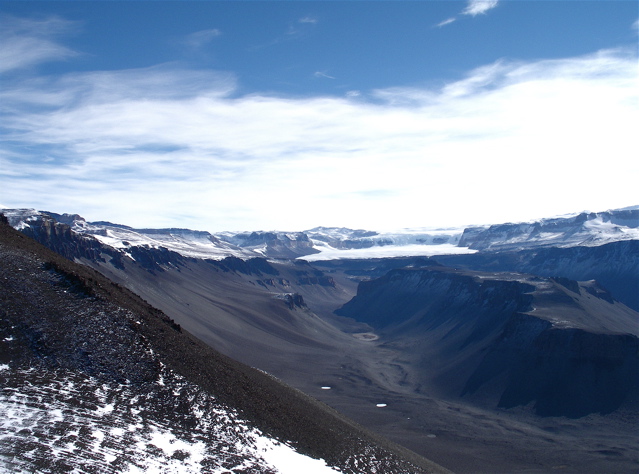( Log In ) Log In is for TREC Teachers & Researchers only
  |
| Dena_Rosenberger |
 Jan 17 2006, 03:22 AM Jan 17 2006, 03:22 AM
Post
#1
|
 TREC Teacher    Group: TREC Team Posts: 96 Joined: 1-November 05 Member No.: 22 |
Tracer
January 13, 2006 For those interested in things Antarctic and some fine journalism, check out the weekly Antarctic newspaper at http://AntarcticSun.usap.gov Hello from the Ice! For additional Antarctic pics, check out the Gallery. Where’s Rosenberger? Antarctica – the actual continent, not just Ross Island! My plane has been delayed until Tuesday! Mechanical problems that I really would like them to fix before I get on to travel across the Antarctic Ocean. You would think that they would have more than one ancient C-17 cargo plane available, but I guess parts had to be flown in from Hawaii to New Zealand where it is sitting. Because of this delay…I won’t get to see my friends, family, and students until next week BUT because of this delay, our lead scientist is sending me back out to the field! I hope my chemistry students did well on their final exam… This will be a new place for me called the Dry Valleys, which is actually on the continent of Antarctica, where I will be helping with a Tracer Experiment for a few days. In the Dry Valleys, there are streams that flow from the glaciers during the summer carrying silt and nutrients through the valleys. There are no larger animals that live in the Dry Valleys, although some mummified seals have been found as far as 40 Km from the present ocean. Although these valleys appear lifeless, they hold some of the most remarkable organisms on Earth, including algae, fungi, worms, and bacteria that have made incredible adaptations to the harsh climate where there is no light for 6 months (There is one group of scientists here that call themselves the “Wormherders”).  In a Tracer Experiment, a known amount of a non-harmful compound, like NaCl, or table salt, is released upstream. Many people are positioned downstream at stations with collection bottles and stopwatches. Every fifteen minutes, the collectors get a water sample at their station. In this way, the researchers can see how the stream works to distribute this compound and how long it takes to do so. Then, they can use this information to model how other compounds, like nutrients, move through the flow. They are also studying the Hyporheic Zone, which is the bed and sides of a stream, to see how various compounds are absorbed into the sediments there. They are interested in the permafrost (permanently frozen) layer under the stream and how its depth changes over the season. For example, frozen sediment may not absorb as much of certain chemicals as others. With this information, they hope to determine and keep track of how nutrients and other compounds are carried through these fragile ecosystems. The stream we will be studying in this experiment is in the Taylor Dry Valley and is called the Von Guerrard near Lake Fryxell. This stream comes directly from the surrounding glaciers and the total length is 11 kilometers, but we will only be looking at a one kilometer section. I will be flying out by helicopter this afternoon with Kaelin, our grad student, and Barb, who works in the laboratory offices and has volunteered to help with the Tracer Experiment. Goodbye Pony Lake! Goodbye Adelie Penguins!  By the way (sniff), last week I got to attend a reception for the senators, congressmen, and representatives that were visiting Antarctica to see the science happening here firsthand. All important visitors here are called “DVs” for Distinguished Visitors. Well, I got to have my picture taken with one of them:  Did you know? Although it rains a trace amount about every 100 years in the Dry Valleys, scientists believe it hasn’t REALLY rained for 2 to 4 million years. You can see sedimentary layers in these magnificent mountains, indicating that at one time they were covered by water.  Current Conditions at McMurdo Station Cloudy and cold Right now: Mostly cloudy with light snow expected Pressure: 29.185 inHg Temperature: 36 oF/ 2 oC with wind chill: 10 F/-12 C Sunset: February 20 at 1:38 am |
| Guest |
 Jan 17 2006, 10:43 PM Jan 17 2006, 10:43 PM
Post
#2
|
|
Unregistered |
I think that snowman should be in therapy ..he/she looks kinda sick
 |
| yo |
 Jan 18 2006, 05:42 PM Jan 18 2006, 05:42 PM
Post
#3
|
|
Unregistered |
Hi Dena, Thanks for all your updates and postings. Also thanks for speaking with the kids at CSG during the phone event. I know that you are bummed being stuck in McM due to problems with the C-17(
|
| Lindsay Ferguson |
 Jan 20 2006, 12:34 AM Jan 20 2006, 12:34 AM
Post
#4
|
|
Unregistered |
 |
  |
2 User(s) are reading this topic (2 Guests and 0 Anonymous Users)
0 Members:

|
NSF Acknowledgment & Disclaimer | Time is now: 18th November 2024 - 06:04 PM |
Invision Power Board
v2.1.7 © 2024 IPS, Inc.








